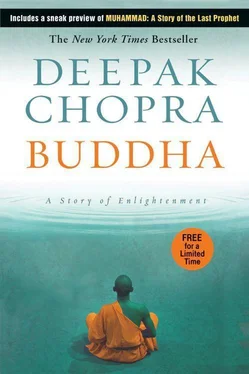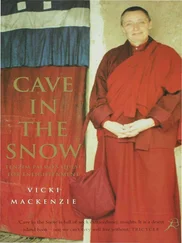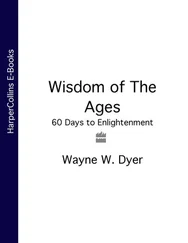“I realize that if I stay here I will only agitate you more,” he said. “So help me. Together we must devise a Dharma that will not frighten people. Beginning with you, my frightened brothers.” The five monks smiled at this, and they began to relax a little. Buddha pointed to the trees in bloom all around them. “The Dharma should be this beautiful, and just as effortless,” he said. “If Nature is awake everywhere we look, then human beings deserve the same. Waking up shouldn’t be a struggle.”
“You struggled,” said Assaji.
“Yes, and the more I did, the harder it was to wake up. I made my body and mind into an enemy. On that road lies only death and more death. As long as your body is your enemy, you are tied to it, and the body has no choice but to die. Death will never be defeated until it becomes unreal.”
Years later Assaji would remember that a rainstorm began to pass through the forest as Buddha spoke. Lightning punctuated his words and lit up his face, which wasn’t the fiercely zealous face of Gautama but something unearthly and serene. They heard the patter of raindrops on the forest canopy, which increased to a steady drumming, yet no rain fell on the five monks, not even a stray drop sizzling in the campfire. In this way Nature was telling them that Buddha was more than a man who had become enlightened. They followed him devotedly after that night.
FOR THE FIRST TIME in six years Buddha’s feet touched the road to Kapilavastu. He traveled with the five monks, who gradually lost their anxiety but not their awe. They ate and slept beside their master. They bathed with him in the river, but he no longer meditated or said prayers. One at a time he took each of his brothers aside and gave them private instructions. They were overjoyed to be told that they were very close to enlightenment and would achieve it very soon.
There was one monk who never spoke up. His name was Vappa, and he seemed the most insecure about Gautama coming back to life. When he was taken aside and told that he would be enlightened, Vappa greeted the news with doubt. “If what you tell me is true, I would feel something, and I don’t,” he said.
“When you dig a well, there is no sign of water until you reach it, only rocks and dirt to move out of the way. You have removed enough; soon the pure water will flow,” said Buddha. But instead of being reassured, Vappa threw himself on the ground, weeping and grasping Buddha’s feet.
“It will never happen,” he moaned. “Don’t fill me with false hope.”
“I’m not offering hope,” said Buddha. “Your karma brought you to me, along with the other four. I can see that you will soon be awake.”
“Then why do I have so many impure thoughts?” asked Vappa, who was prickly and prone to outbursts of rage, so much so that the other monks were intimidated by him.
“Don’t trust your thoughts,” said Buddha. “You can’t think yourself awake.”
“I have stolen food when I was famished, and there were times when I stole away from my brothers and went to women,” said Vappa.
“Don’t trust your actions. They belong to the body,” said Buddha. “Your body can’t wake you up.”
Vappa remained miserable, his expression hardening the more Buddha spoke. “I should go away from here. You say there is no war between good and evil, but I feel it inside. I feel how good you are, and it only makes me feel worse.”
Vappa’s anguish was so genuine that Buddha felt a twinge of temptation. He could reach out and take Vappa’s guilt from his shoulders with a touch of the hand. But making Vappa happy wasn’t the same as setting him free, and Buddha knew he couldn’t touch every person on earth. He said, “I can see that you are at war inside, Vappa. You must believe me when I say that you’ll never win.”
Vappa hung his head lower. “I know that. So I must go?”
“No, you misunderstand me,” Buddha said gently. “No one has ever won the war. Good opposes evil the way the summer sun opposes winter cold, the way light opposes darkness. They are built into the eternal scheme of Nature.”
“But you won. You are good; I feel it,” said Vappa.
“What you feel is the being I have inside, just as you have it,” said Buddha. “I did not conquer evil or embrace good. I detached myself from both.”
“How?”
“It wasn’t difficult. Once I admitted to myself that I would never become completely good or free from sin, something changed inside. I was no longer distracted by the war; my attention could go somewhere else. It went beyond my body, and I saw who I really am. I am not a warrior. I am not a prisoner of desire. Those things come and go. I asked myself: Who is watching the war? Who do I return to when pain is over, or when pleasure is over? Who is content simply to be? You too have felt the peace of simply being. Wake up to that, and you will join me in being free.”
This lesson had an immense effect on Vappa, who made it his mission for the rest of his life to seek out the most miserable and hopeless people in society. He was convinced that Buddha had revealed a truth that every person could recognize: suffering is a fixed part of life. Fleeing from pain and running toward pleasure would never change that fact. Yet most people spent their whole lives avoiding pain and pursuing pleasure. To them, this was only natural, but in reality they were becoming deeply involved in a war they could never win.
As the gates of Kapilavastu drew close, Buddha prepared the way. He sent his presence ahead, and he could feel a growing excitement in Yashodhara. She ordered her servants to throw away the somber saris of a widow; she brought out old portraits of Siddhartha to show their son, Rahula, who might be frightened to see the return of a father he knew only in the cradle. Every day Yashodhara performed the same ritual. She would gather Rahula by her side and sit in the gazebo by the lotus pond, the place where Suddhodana’s pleasure pavilion used to stand. The old structure had been torn down and the courtesans given honest places as serving women. Siddhartha had never visited them. It was one way he could show his fidelity to Yashodhara. Now she waited there to show her fidelity to him.
Buddha knew that feeling his presence was not enough, though. His wife was still young; for that matter, Siddhartha would be only thirty-five. There was time for more children. Buddha’s presence couldn’t reach this part of Yashodhara’s nature. How could he change her mind without crushing her? The bliss of wedded life was what she lived for.
His mind was preoccupied when the five monks began to stir with agitation. Buddha looked up the road where they were pointing. A horse lathered with sweat and streaming with blood was running toward them in a panicked gallop. The five monks scattered to get out of the way. It was a powerful black stallion. None of them dared to pull Buddha from harm’s way; he stood his ground, and as the animal got near, it reared, slashing out with its iron-shod front feet. For a second the huge animal balanced in midair, thrashing. Then its hooves came to earth without hitting their target. The stallion trembled with pain and terror, but it didn’t rear again and slowly began to calm down.
“What happened?” asked Assaji, pressing the cloth of his robe to the horse’s worst wound. “Where did this come from?”
“Only one thing is possible,” said Buddha. “War. We’ll be in the thick of it soon enough.”
They hadn’t gone another mile before his prediction came true; the din of battle could be faintly heard in the distance. “I am the cause of this,” said Buddha. The five monks protested, but Buddha said no more. The group had their hands full keeping the wounded stallion from bolting when he caught the scent of death. More than once Buddha had to pause and look the animal directly in the eye. “The only way to convince him that he doesn’t need to be afraid is to show him that I am not. Animals are wiser than us in that regard. If they don’t feel peace, they aren’t fooled by peaceful words.”
Читать дальше












